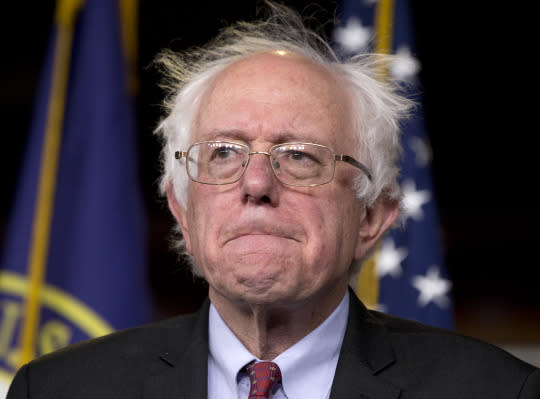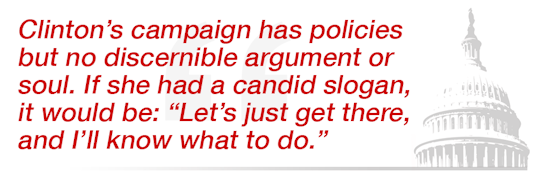Time to take Sanders seriously

Some polls have Bernie Sanders overtaking Hillary Clinton in Iowa and opening up a double-digit lead in New Hampshire. (Photo: Carolyn Kaster/AP)
After I wrote about the twisted codependency of Donald Trump and the media a few weeks back, some readers got in touch to complain that the attention paid to Trump had all but obscured the rise of Bernie Sanders. In an interview with CNN that week, Sanders himself made the same point, referring to a report that claimed network news shows had devoted 234 minutes to Trump and only 10 to his campaign. (Yes, 10 – for the entire year.)
Judging from what’s happening right now in Iowa and New Hampshire, Sanders and his avid supporters have a legitimate point.
Just as the Democratic primaries were the dominant story in the 2008 cycle, so has the Republican train wreck proved to be the most compelling storyline this year. But with less than three weeks to go before the voting starts, Sanders may be just as plausible a nominee as Trump.
A New York Times/CBS News poll this week showed Sanders, who trailed Hillary Clinton among Democrats by 20 points a month ago, closing that gap to 7. But national polls are essentially meaningless; what’s more impressive are polls that have Sanders overtaking Clinton in Iowa and opening up a double-digit lead in New Hampshire.
It’s hard to know exactly what we’re looking at here. Is Sanders making a last, spirited stand before reality crashes down on him? Or is this the year when the molecular structure of our politics — on both sides — is about to be smashed apart and scrambled?
History would certainly suggest the former — that Sanders is only the latest in a long line of leftist insurgents, popular with college kids and urban idealists, who shake the party’s establishment without ever really threatening to topple it. The most obvious comparison is to Howard Dean, who by the end of 2003 was dominating the cycle in terms of both polling and money, and who went on to win a single primary — in his own tiny state.
Maybe an even better analogue would be the 2000 Democratic campaign, which was the first one I covered. The entire party establishment then was lined up behind the sitting vice president, Al Gore, but by the end of 1999, the former senator Bill Bradley was still running strong. Much like Sanders, Bradley ran against the legacy of Clintonian calculation, disparaging the incrementalism of the ’90s.
Bradley endured a withering assault from Gore and the party’s leaders, then got whacked in Iowa and edged out in New Hampshire. From that moment on, he was a dead candidate walking.

Clinton is as flawed a candidate as Gore was, and not terribly trusted by the electorate; I’ve never assumed she was a lock for the nomination in the way a lot of my colleagues did. But in Sanders (in contrast to a younger governor like Martin O’Malley, whose campaign has foundered), she drew a chief competitor who’s 74, socialist and scolding. You could argue that no establishment candidate in the last 40 years has gotten luckier than that.
And yet we can all get too hung up on history, and there are reasons to think that the Democratic primaries in 2016 might not be a replay of years past.
In 2000, the antiestablishment current in public life had just begun to assert itself (among the outsiders who threatened to run that year was Trump himself), and the Internet was a crude new tool for organizing and raising money.
Now, of course, the attitudes of most voters toward their own party leaders range somewhere between indifferent and contemptuous, and small-dollar fundraising online has obliterated whatever structural advantage an anointed candidate once enjoyed. Sanders raised $73 million in 2015 — about $40 million less than Clinton, but more than enough to run a competitive national campaign.
Clinton, meanwhile, continues to run a strangely remote and impersonal campaign, the political equivalent of a drone operated out of some desert trailer. Everything seems carefully selected for minimal engagement — the orchestrated town halls, the carefully navigated TV interviews, the occasional think-tank speeches.
Clinton’s campaign has policies — just this week, feeling the pressure, she highlighted a series of sober and eminently sensible proposals for making the wealthy pay more taxes — but no discernible argument or soul. If she had a candid slogan, it would be: “Let’s just get there, and I’ll know what to do.”
Only recently has Clinton even seen fit to really acknowledge her chief opponent, going after Sanders for his record of supporting the gun industry. For most of the campaign, she has treated him more like the doddering uncle one must respect even as his dinner-table tirades grow tiresome.
That’s a dangerous way to run against a tireless, plainspoken populist, at a moment when voters, for better or worse, yearn to feel some emotional connection to their politicians. Of all the attitudes a candidate might project right now, exasperation and entitlement are two of the least helpful.
Most significantly, though, the country is in a vastly different place, economically and psychically, than we were when Gore plowed his way through to the nomination that was assumed to be his.
Consider the way Bill Clinton began his final State of the Union address at this time in 2000: “Never before has our nation enjoyed, at once, so much prosperity and social progress with so little internal crisis and so few external threats.” He went on to reel off a series of statistics that were to be the basis of his legacy — crime down by 20 percent, teen births down for seven straight years, welfare rolls cut in half.
That wasn’t anything like the tone of Obama’s final address this week, 15 years after Sept. 11 and eight years after the collapse of Wall Street. “Anyone claiming that America’s economy is in decline is peddling fiction,” he said, in a speech that seemed almost plaintive at times. “What is true — and the reason that a lot of Americans feel anxious — is that the economy has been changing in profound ways, changes that started long before the Great Recession hit and haven’t let up.”
As the heir to the previous administration, Clinton isn’t running with the kind of gusting tailwind that propelled Gore forward in 2000, and that may be the most salient fact of her existence this year.

You’d have to conclude that Sanders has at least an even chance of winning one of the first two states, and decent odds of winning both.
And if so, what happens then?
Even winning both Iowa and New Hampshire wouldn’t make Sanders the likely nominee. The main reason Obama was able to surpass Clinton in the 2008 primaries, unlike other insurgents in the party’s modern history, is that he peeled off most of the black voters on whom the establishment candidate always relies. Sanders probably can’t, which is why Clinton would still have the edge in South Carolina and in a lot of big states that follow.
But if Clinton comes out of the first two contests badly weakened, establishment Democrats will find themselves in the same chaotic, panicked state they’ve been chortling about while watching the Republicans. There would be renewed calls, inevitably, for another late entry into the field — namely Joe Biden, who took an unexpected swipe at Clinton on income inequality this week.
For Clinton, what it would mean, mostly, is that she’d have to settle in for the next installment of a tedious movie she hoped never to have to revisit: “The Long, Dark Slog Through Delegate Hell, Part II.”
All she could hope, in that event, is that it doesn’t end the same.

